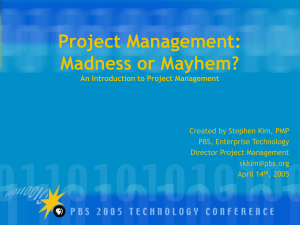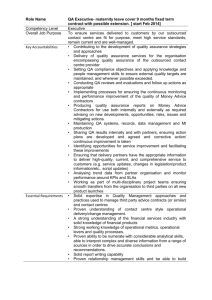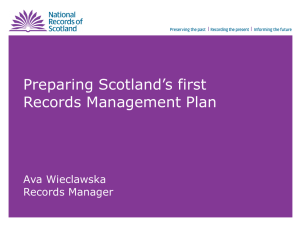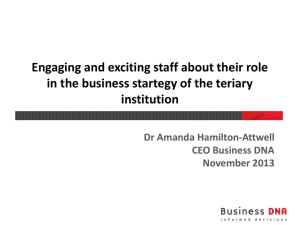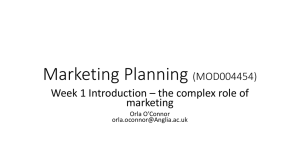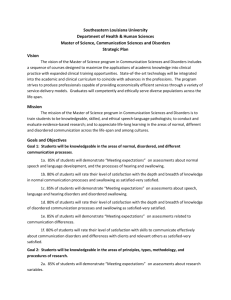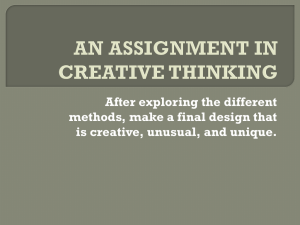2. How is good customer service achieved?
advertisement
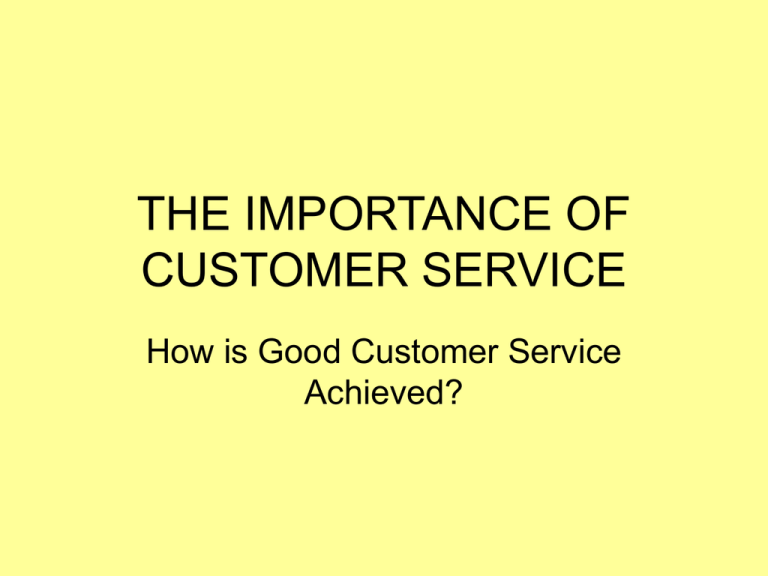
THE IMPORTANCE OF CUSTOMER SERVICE How is Good Customer Service Achieved? MARKET RESEARCH LEARNING INTENTIONS: • I understand the role of market research in keeping customers satisfied. SUCCESS CRITERIA: • I can explain why businesses would carry out market research • I can describe the different types of market research that businesses may use WHAT MAKES GOOD CUSTOMER SERVICE? • Keeping customers well informed of progress and changes. • Under-promise and over-deliver – do not set expectations too high so that customers will not be upset if they are not met, however, if you can deliver more than what they are expecting customers will be pleased. • Go the extra mile to ensure customer’s needs/expectations are always met. WHAT AFFECTS WHETHER CUSTOMERS’ EXPECTATIONS ARE MET? • Reliability/quality of the product/service; • Consistency over a period of time – how does it match up to the last good/service purchased? • The speed and flexibility of delivery – can the organisation accommodate the customer’s needs, for example, can they deliver within 24 hours? • Courtesy and attitude of staff – from those on the shop floor to the delivery drivers; • The information given about the product – was it accurate? Did it do all the business claimed it would do? • How did the organisation react if help was needed? Were staff happy to assist the customer? HOW CAN CUSTOMER SATISFACTION BE MEASURED? ANSWER: BY MARKET RESEARCH Organisations often survey customers or ask for feedback to ensure that high standards of customer service are being met or to find out if there is any way things can be made better. Can you think of any methods a business could use to get this information? HOW MANY OF THESE DID YOU GET? • a written survey or questionnaire is posted out to customers; • telephoning customers to ask pre-set questions; • e-mailing customer questionnaires; • holding a meeting of invited customers to answer questions/give opinions; • face to face interviews given at point of sale or on entry and exit from the business; • mystery shoppers – who act as customers to experience the service given by the organisation. • suggestion boxes/schemes for customers to leave anonymous suggestions/opinions. FIELD RESEARCH The methods of market research we have just discussed are all methods of FIELD RESEARCH. This involves collecting information from customers or potential customers first-hand. This is PRIMARY INFORMATION and has the benefit of being up-to-date and reliable. However, it has the disadvantage of being time-consuming and expensive to collect. DESK RESEARCH Another method of market research which can be used is DESK RESEARCH. In this method SECONDARY INFORMATION is collected. This is information which has already been collected for another purpose but which can be used for a different purpose eg Census. This information is much quicker and cheaper to gather but the data may be out-of-date or inaccurate. USES OF MARKET RESEARCH DATA Results of market research can be useful for finding out: • if there is a market for the product/service • the price that customers are willing to pay • the amount of competition there is • customers shopping habits • new ideas for the product/service from what customers say they want TASK Complete the customer satisfaction task for the school canteen. PRODUCT RESEARCH AND DEVELOPMENT LEARNING INTENTION: I understand the role of product research and development in keeping customers satisfied. SUCCESS CRITERIA: I can describe how new products are created from the initial idea to product launch. Product development is about trying to satisfy customers by being enterprising and coming up with NEW products for them. This can involve the following activities: • • • • Coming up with new ideas from enterprise or market research Deciding what is the best idea to try Designing the features of the new product CREATING A PROTOTYPE (a working first version of the product) • Testing the prototype on some customers • Identifying improvements that could be made to the prototype • Changing the prototype in light of testing results • • • • Deciding where to sell the product Deciding what price to sell the product for Deciding how to promote the product Making and launching the final product TASK Now try Worksheet 21 THE MARKETING MIX LEARNING INTENTIONS: I understand the role of the marketing mix in keeping customers satisfied. SUCCESS CRITERIA: I can describe the marketing mix for a range of products and services THE 4 Ps! If a business wishes to meet the needs of its customers and sell its products successfully it must develop a strategy based on the 4 P’s – Product, Price, Promotion and Place. How these 4 elements are combined is referred to as the MARKETING MIX and will determine how well a product will sell. PRODUCT The good or service that the customer purchases. The product includes: • quality • packaging • guarantee and after-sales service PRICE The actual amount paid for the product or service by the customer to the seller. PROMOTION The way in which the customer is made aware of a product or service and persuaded to buy it. Promotion includes Advertising and sales promotions. PROMOTION CONT’D ADVERTISING – this can be done via newspapers, magazines, leaflets, billboards, television and radio depending on the budget available. SPECIAL PROMOTIONS – these can be discounts, eg 25% off or BOGOF to encourage new sales, free Samples for new customers, money off vouchers to encourage another purchase, for example. PLACE Where the customer can purchase the good or service – how easy it is to buy. TASK The task for the seller is to: Promote the right Product at the right Price in the right Place! Open up Worksheet 22 for a task on the Marketing Mix. QUALITY LEARNING INTENTION: I understand the role that quality goods and services can play in keeping customers satisfied. SUCCESS CRITERIA: • I can explain what is meant by the term ‘quality’ and why businesses should focus on this. • I can explain how using quality resources, quality control, quality assurance and quality management can contribute to product quality. What is Quality Imagine you are buying a new mobile phone. What would be quality for this product in your opinion? Quality means different things to different people, but businesses need to make sure they are keeping all their customers satisfied. Video Clip Good quality is a difficult process for businesses to maintain as high quality output often means high costs. How can they balance quality and cost? Let’s here what some business experts think: www.bbc.co.uk/learningzone/clips/quality-vs-cost-cutting/10968.html The Importance of Good Quality Products and Services Businesses need to make sure that they produce quality products that do what customers expect and are reliable. Quality is a very important issue for a business because if finished products do not satisfy customers then the business could fail. This is because customers will stop buying from the business and it could face court action and fines if Government quality laws have been broken. How can Quality be Achieved? USING HIGH QUALITY RESOURCES The stock and factors of production used should be of a high enough standard to produce quality finished products. This can be achieved through using QUALITY SUPPLIERS, providing TRAINING for staff and repairing and MAINTAINING equipment regularly. How can Quality be Achieved? USING A SYSTEM OF QUALITY CONTROL Quality control is about checking at the END OF PRODUCTION that products are of a high enough quality. Any poor quality products that are found are scrapped or sent back to be fixed. Quality control helps improve quality because poor quality products can be found and so are prevented from leaving the business and going to customers. How can Quality be Achieved? USING A SYSTEM OF QUALITY ASSURANCE Quality assurance is about setting quality standards, making them clear to staff before they start work and then checking that products meet these standards at EACH STAGE OF PRODUCTION. Any mistakes found at each stage of production will be fixed before the product moves on. Quality assurance helps improve quality because staff are actively working to high quality standards and so mistakes are less likely to happen. MOTIVATING STAFF There are many methods that management can use to motivate staff to perform their jobs well and keep standards and quality of work high. QUALITY CIRCLES are where members of the organisation meet regularly to discuss any quality issues and ways of improving quality. They then put their ideas into practice and are hopefully able to see their ideas succeed giving them satisfaction and motivation in their jobs. MOTIVATING STAFF TOTAL QUALITY MANAGEMENT (TQM) is where all employees in the organisation are trained to achieve the highest standards and always look for ways of improving the production of the product. All employees take pride in the work that they do for their colleagues and for the final customer. Task BMW cars are known world-wide as cars produced to the highest standard. Visit the website address shown below: www.bmweducation.co.uk/coFacts/view.asp?docID=54 Study the website and list in your jotters some of the measures that BMW employ to ensure the production of high quality cars that maximise customer satisfaction. CONSOLIDATION Produce a poster, Powerpoint or 4-page booklet on the importance of Customer Service and how a business of your choice attempts to achieve this. The business you choose should not be one we have already studied in this topic area.
